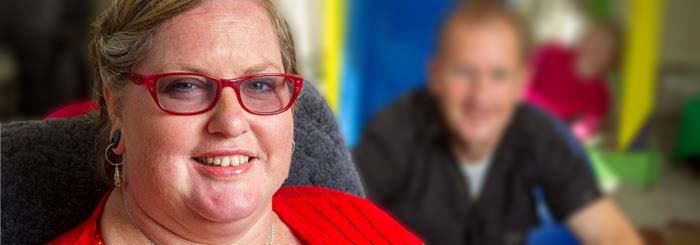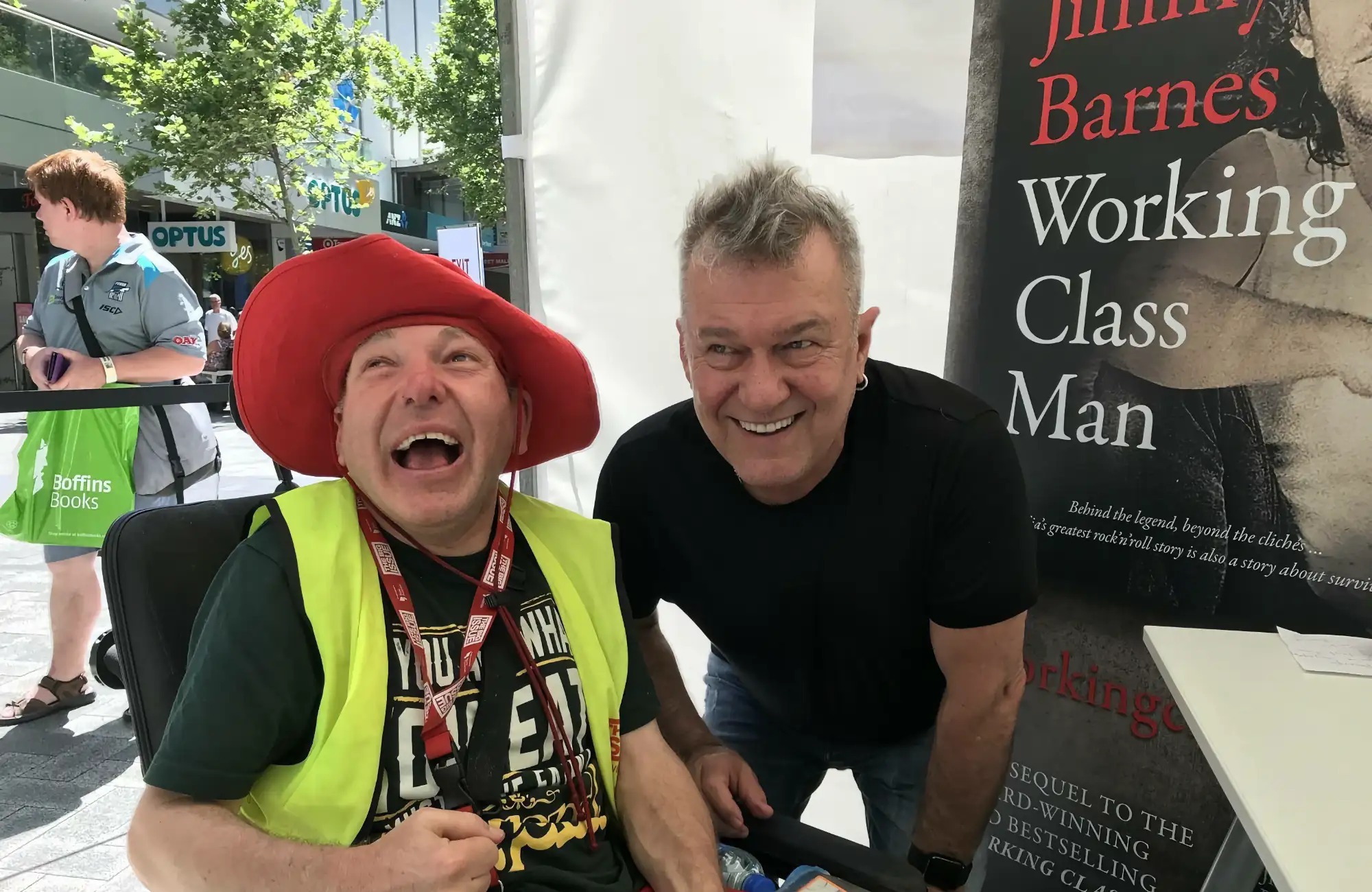Individualised disability support care NDIS for people with disability in Western Australia information for the introduction to My Place (WA) Pty Ltd website.
Welcome to My Place
My Place is a National Disability Insurance Scheme registered, not-for-profit provider of individualised and flexible supports to people with disability and their families. My Place was established by the founders of local area co-ordination in 1996.
My Place supports around 400 people with disability to live in their own homes, or remain in their family home, and become valued and contributing members of their community. My Place does not provide any group home, day centre or other congregate care services.
This website provides detailed information on the individualised support arrangements that are offered by My Place. What connects the various arrangements is that the person is always in control of the supports they receive; when, where and how they receive those supports; and from whom they receive those supports.
Individualised disability support care NDIS for people with disability in Western Australia information for the Shared Management Service at My Place (WA) Pty Ltd.
We can do it together...
You may prefer an arrangement where you employ or contract your own support people and have My Place assist you with planning and implementing your supports - as well as managing and administering your funds. Planning and support from My Place will include, among other things:
Management and administration from My Place will include:
Having your funding administered by My Place gives you access to potentially significant reductions in worker’s compensation premiums, general insurance, vehicle purchase/leasing costs, GST and transfer duty, and vehicle running costs.
You will receive comprehensive and easy-to-read resources to help you to be the employer of your own supports. My Place’s ‘How to be a Good Employer Guide’ includes: sample key policies you need to have in place; information about the types of employment arrangements you can offer; employment contracts that capture those different arrangements; and practical resources to attract, recruit, train and supervise your support people.
You will be given your own secure link to the Employer Portal on My Place’s individualised database, iPlace, which will provide you with real-time information on how much of your funding you have spent, what you have spent it on, how much funding is left and how much you should have spent at that point in the funding cycle. The Employer Portal provides you with a simple method of uploading new employee details, funder-required certifications, and qualifications completed. It also enables you, or your support people, to submit electronic timesheets for the days/hours they have worked and any leave they have taken.
You will be allocated a My Place co-ordinator who will help you to plan and cost your services. The co-ordinator will meet with you on an agreed basis, be there to support you through the funding plan review cycles and be available to advise you in managing your supports. My Place maintains an emergency funding pool for the unexpected occasions that things go wrong and additional funding is needed for a period of time.
An advantage of you being the employer is that, under certain conditions, support people can be employed under arrangements that best suit you and offer you far greater flexibility in pay levels and hours of work than a typical service provider enjoys.
Liz experienced a brainstem stroke in 2006 and has used a wheelchair since. Following her stroke, Liz received government funding to enable her to return from hospital to the community. Liz chose the ‘shared management’ arrangement as she envisioned that she would be able to maximise her funding, as well as have the freedom, flexibility and control over her life that she sought: 'Living my life my own way,' as she put it.
My Place provides Liz with administration and payroll services, whilst Liz takes care of planning and arranging the support that she needs on a daily basis. This means Liz takes responsibility for hiring, firing and directing her support people, whilst My Place takes care of all the wages, insurances, taxes and superannuation, as well as other behind the scenes roles, such as regular reporting back to the funder.
This enables Liz to have autonomy in her life, the scope of which she says is broad and varied, from having full control over who may enter her home, to ensuring her support people provide her support in the manner she wants.
Liz currently works as a peer support co-ordinator in the disability sector, which she describes as the best job ever. She is also an accomplished artist. ‘Having my own home has allowed me to create a studio,’ says Liz, plus an office space so I can work from home and spend more time with my daughter, Willow’. Liz describes herself as ‘a bit of a foodie’ and says that she and Willow love cooking together. With a daughter to raise and love, a dog in the family, chickens in the backyard and fish in the pond, Liz says, ‘I live a good life. My ability to control how I live and the choice of who comes into my life is empowering, I’m happy.’
Individualised disability support care NDIS for people with disability Western Australia information for the support arrangement service offered by to My Place (WA) Pty Ltd. Articles on individual clients and the benefits My Place have made to their lives.
We can do it for you (but not without you)...
Some people with disability or their families prefer a support arrangement that leaves them with the least administrative hassle or legal responsibility. If you prefer this type of arrangement, you can ask My Place to co-ordinate your services and also employ support people on your behalf. In other words, My Place:
Each person who chooses this type of arrangement is allocated a My Place co-ordinator. Each co-ordinator works with an average of 12 people, ensuring that they get to know you well and can remain in close contact. Many co-ordinators employed by My Place have had lengthy experience as local area co-ordinators with the former WA Disability Services Commission or as service managers with other non-government disability services. All are carefully chosen on the basis of their values and the quality of support they can provide. My Place will charge you an additional fee to cover the cost of your co-ordinator.
There are a number of specific support arrangements from which you can choose, and from which you can also ‘mix and match’. The most common support arrangements that are offered by My Place are described below.
Flexible Supports
The Flexible Supports arrangement involves a My Place personal assistant (our name for support workers because it signals to everybody that you are in control) providing agreed support when, where and how you decide. This support could be in your home, in the community, at TAFE or university, in a regular workplace, at a recreation centre, in a gym, at the pool, or on holidays.
Homesharer
The Homesharer arrangement appeals to those who feel that the best living arrangement is to move in with a person, couple or family who have been carefully matched to you and your needs and preferences to provide a safe, secure, comfortable and welcoming home. Homesharers can be younger parents with one or two of their own children living at home, middle-aged parents whose children have left home, older couples or single persons of varying age. You may move into the homesharer's home or the homesharer may move into your home.
Identification and matching of homesharers is a very careful and thorough process with you at the centre of decision-making at all times: before and after any arrangement has commenced. My Place provides training to homesharers to further ensure they are competent and suitable to have you living with them. Homesharers are visited regularly by the My Place co-ordinator to check that the arrangement is running smoothly for everybody involved.
My Place also offers homesharing opportunities to young people with disability who are under the care of the Minister for Child Protection. Some have remained living with their homesharer families after they have turned 18, while others have successfully moved into their own homes with ongoing support from My Place. More information about homesharing for young people under care and protection orders can be found in the brochure.
Mentor
The Mentor arrangement, as the name suggests, is less about direct support provided at agreed times by a My Place personal assistant. It is more about a My Place mentor being there at the right times (and on-call at other times) to help you make better decisions and take the right actions by understanding the consequences of not doing so. My Place mentors also helps you connects with your neighbours and local community, and assist you to develop useful skills and to fulfil valued roles in society. My Place is leading the WA disability sector of this type of support arrangement and matches mentors to generally younger people who live independently, but appreciate having someone they know and trust providing them with advice and support when it is needed.
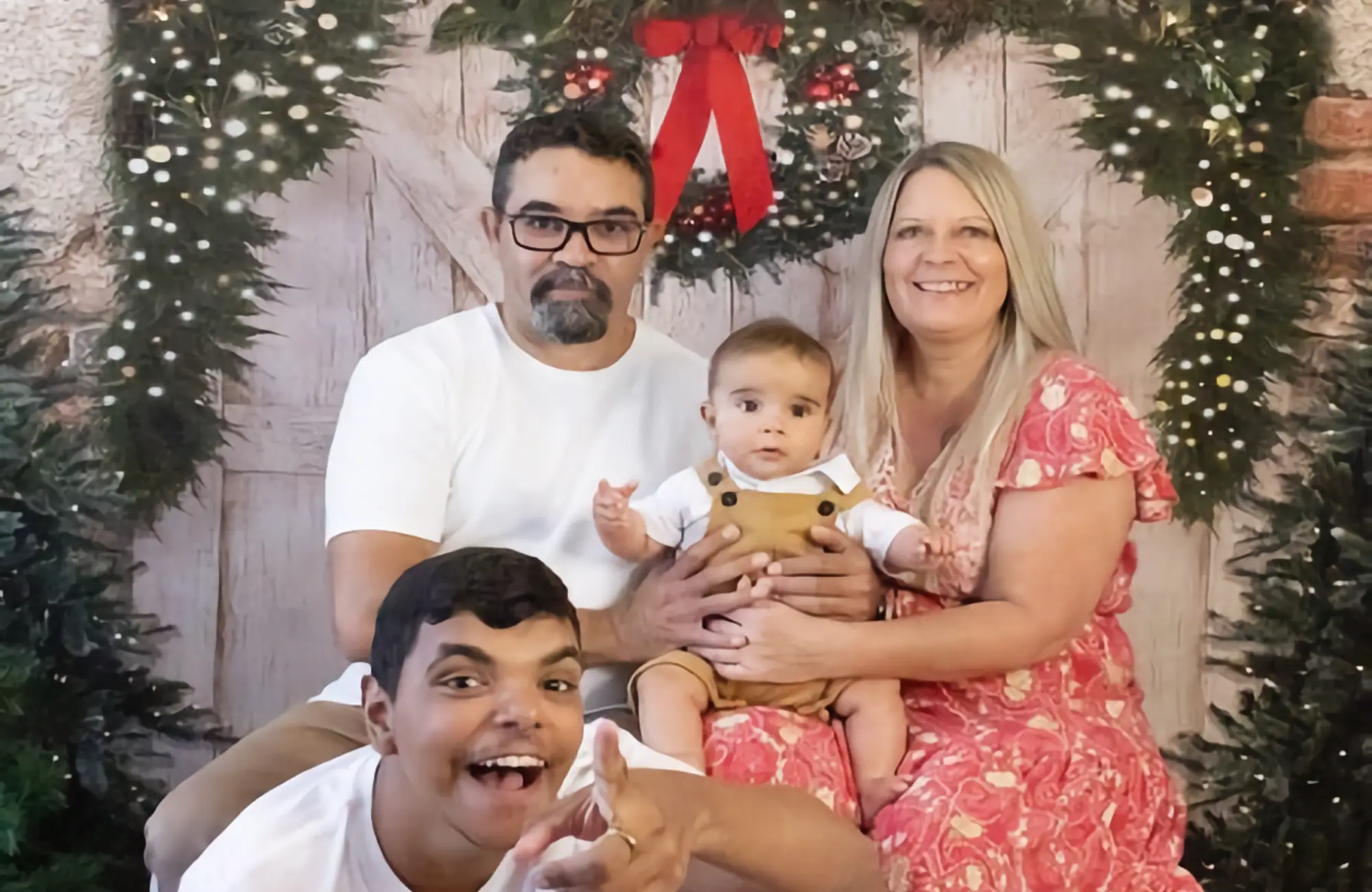
Jacob
Jacob is a young and proud Aboriginal (Noongar) man. Jacob had been in the care of the Department of Communities’ Child Protection Services since birth. For the first 15 years of his life, he was supported in a kinship arrangement - living with his maternal nan in rural WA. As Jacob grew and his support needs increased, his nan approached the Department to seek alternative care arrangements for her grandson. Given the geographical remoteness, Jacob had missed out on opportunities for early intervention and support to build his independent living skills. Jacob’s family worked with the Department to engage a foster family that was closer to school and services, but enabled him to maintain his strong connection with family and country.
Jacob initially came to live with Naydene and Johnno. In the spirit of fostering, Naydene and Johnno opened up their home and their hearts to Jacob. Once Jacob turned 18, he automatically left the child protection system, but remains living with Naydene and Johnno in a homesharer arrangement. During his time with Naydene and Johnno, Jacob successfully completed high school.
Since leaving school he has developed a number of valued roles in his community, including the local Aussie Rules Football team - where he attends training, match games and helps out where he can. Jacob loves young children and is a proud ‘big brother’ to Naydene and Johnno’s new baby boy. Jacob is currently exploring employment opportunities in childcare and gardening.
When Rob was an infant, he was involved in a major accident that left him with significant injuries. At seven, he was placed into institutional care and lived in various group homes for the next 40 years. Rob finally decided that he would like his own home and live closer to his sisters. He eventually secured a house through the state government and, with support from his sisters and My Place, moved into his own purpose-built home in 2014.
Rob identified early on that his priorities were to become stronger and healthier to increase his level of independence, to see more of his family, to make new social connections and to be involved in the daily running of his home. When asked what the best thing was about living in his own home, he said ‘I get to go to the shops when I want, buy what I want and cook what I want for dinner each night.’
Rob currently lives with his co-resident, Stephen, who is employed by My Place, from Monday to Friday. Rob has three amazing PAs, also employed by My Place, who variously live with him over the weekends. Rob has had a long-term job selling 'The Big Issue' magazine in the city from Wednesdays to Fridays. He has a prime spot on the overpass outside Perth railway station, knows a lot of interesting people and has built up quite the reputation around the city selling the magazine. Rob enjoys riding his three-wheel bike around the streets, nearby parks and along West Coast Drive. His house is decorated with art pieces that he has produced himself. He also enjoys spending time at the beach, cooking barbecues, having a pub feed and enjoying an apple cider. Rob’s next big goal is to save up for an ocean cruise to wherever.
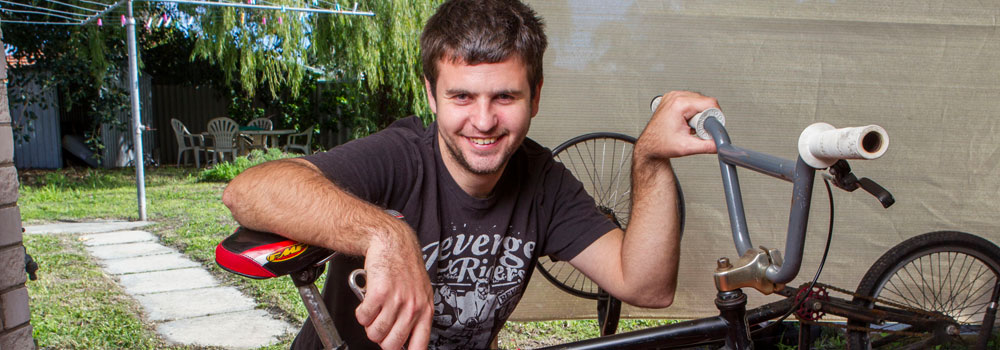
Damien
Damien has been supported by My Place since he was 18. Originally, he lived with a family in a homesharer arrangement, but eventually he wanted to move into his own home. Damien's homesharer helped him get ready to live in his own place by showing him all the things he would need to do around the house: like cooking, cleaning, shopping, paying bills and budgeting his money.
Soon after he turned 25, the homesharer and My Place helped Damien to find and rent a suitable house in an area that he wanted to live. Damien is supported by several My Place PAs who help him to manage his life and work toward his goals. Damien’s supporters assist him to manage his tenancy, maintain his family relationships, juggle household responsibilities, and be ready and prepared for the working week. He is currently working as a truckie’s offsider, with his employer funding him to complete forklift training. Alongside his current work there are efforts underway to expand his employment activities or even develop his own micro-enterprise. Damien has now secured his learner’s permit and is undertaking driving lessons. In the interim, he enjoys using an electric bike to get himself to work and to catch up with his friends. Damien is an avid sports lover and plays basketball, football and cricket. Recently, he travelled to Broome with one of his sporting clubs to participate in a sports camp. My Place supported him on the journey.
Damien acknowledges that he has not always made the best choices over the previous 20 years and things have not always work out well for him. However, he also knows that, no matter what situation he finds himself in, My Place is on his side and will not judge or criticise him. Instead, he will be encouraged and supported to deal with the consequences of those decisions and to make better choices the next time around.
In 2005, one week after his 18th birthday, Nathan was hit by a car while riding his motorbike. The accident almost killed the apprentice electrician and left him with an Acquired Brain Injury. This has greatly affected both his mobility and his speech.
Nathan has been supported by My Place since 2011. He lives independently with a flatmate of his choosing and is supported by two mentors from My Place. One of his mentors is a personal trainer and the other is a professional voice coach. Those two skill sets align with Nathan’s biggest goals, which are to increase his physical mobility and improve his speech. Nathan has spent months on the mats at the gym. Not only can he now stand unassisted, but he recently jumped for the first time in the 10 years since his accident.
The mentors also support Nathan with meal planning, budgeting, bill paying, house work, medical appointments and communication. All of this is done in a very consultative and facilitative way.
Nathan enjoys an active lifestyle and strong connections with family, friends and his local community. He has taken up a past passion of woodworking, using only hand tools to create utensils and furniture for family and friends. He and his flatmate recently undertook an epic across-Australia camping trip. Nathan is living life the way he wants and My Place is there to support him when and how he wants.
Nathan has now turned his experiences into a compelling story of change and hope. As Nathan likes to say, ‘None of this has affected my ability to be awesome!’ He speaks in public about his experiences since his accident and how for him to be successful, he needs his supports to be absolutely customised to him.
Individualised disability support care NDIS for people with disability in Western Australia, information for the about us page to My Place (WA) Pty Ltd website. Describing their values and commitment to service.
About My Place
Our Shared Values
(what you and My Place jointly believe and commit to achieve)
- Autonomy - Promotion of independent thought and action through exploring, choosing and creating.
- Individuality - Acknowledging and respecting our unique needs and desires.
- Equality - Promotion and protection of equal rights and opportunities for all.
- Accomplishment - Personal success, growth and fulfilment.
- Security - Stability of desired lifestyle and confidence about the future.
- Humanity - Commitment to enhancing the well-being of all.
Service Charter
(how My Place will work with you)
Commitment to You
My Place works hard to get things right in delivering supports to you but realise supports can always be improved. Your feedback is crucial to improving those supports. Therefore, your complaints and feedback are welcomed.
Acknowledgement of Country
My Place acknowledges the Traditional Custodians of country in which it operates and recognises their connection to land, water and community.
Individualised disability support care NDIS for people with disability in Western Australia, information for employment opportunities at My Place (WA) Pty Ltd.
Working at My Place
What do I want from work?
If this works for you, you may want to work for My Place
My Place is looking for people who would like to:
What will I be asked to do?
Your duties as a support person with My Place will vary greatly, depending on the person you are supporting. Some of the more common duties include:
LIFESTYLE SUPPORT
DAILY LIVING SUPPORT
COMMUNITY ACCESS SUPPORT
HEALTH CARE SUPPORT
FINANCIAL MANAGEMENT SUPPORT
Your job opportunities
Expression of interest
If you feel the outlined requirements and duties at My Place are suited to you and would like to express your interest in a future position with My Place or a My Place Consumer, please select either OPTION 1 or 2 below or call us on 6380 2927.
NDIS Worker Orientation Module
Please note that the NDIS Worker Orientation Module ‘Quality, Safety and You’ is a mandatory requirement for all employees working in the disability sector. If you have not done so, click here to complete the Worker Orientation Module. Your certificate of completion will be required upon commencement of employment with My Place and to retain employment with My Place.
NDIS Worker Screening
The NDIS Worker Screening Check (NDIS Check) is required for all prospective support persons. In Western Australia, the NDIS Worker Screening Unit within the Department of Communities will undertake the NDIS Check.
Information about how to apply, how much it will cost and when to apply can be found on the Applying for an NDIS Check webpage. The online application can be initiated via DoTDirect and applicants will then need to attend a DoT Service Centre to complete the application process.
-
OPTION 1
My Place's PDF Acrobat expression of interest PDF is available for download to apply for a position as a personal assistant with My Place or a My Place Consumer who employs their own support staff.
-
OPTION 2
To apply online for a position as a personal assistant with My Place or a My Place Consumer who employs their own support staff, please use the electronic expression of interest application form.
Individualised disability support care NDIS for people with disability in Western Australia, information on the directors of My Place (WA) Pty Ltd website.
Board of Directors
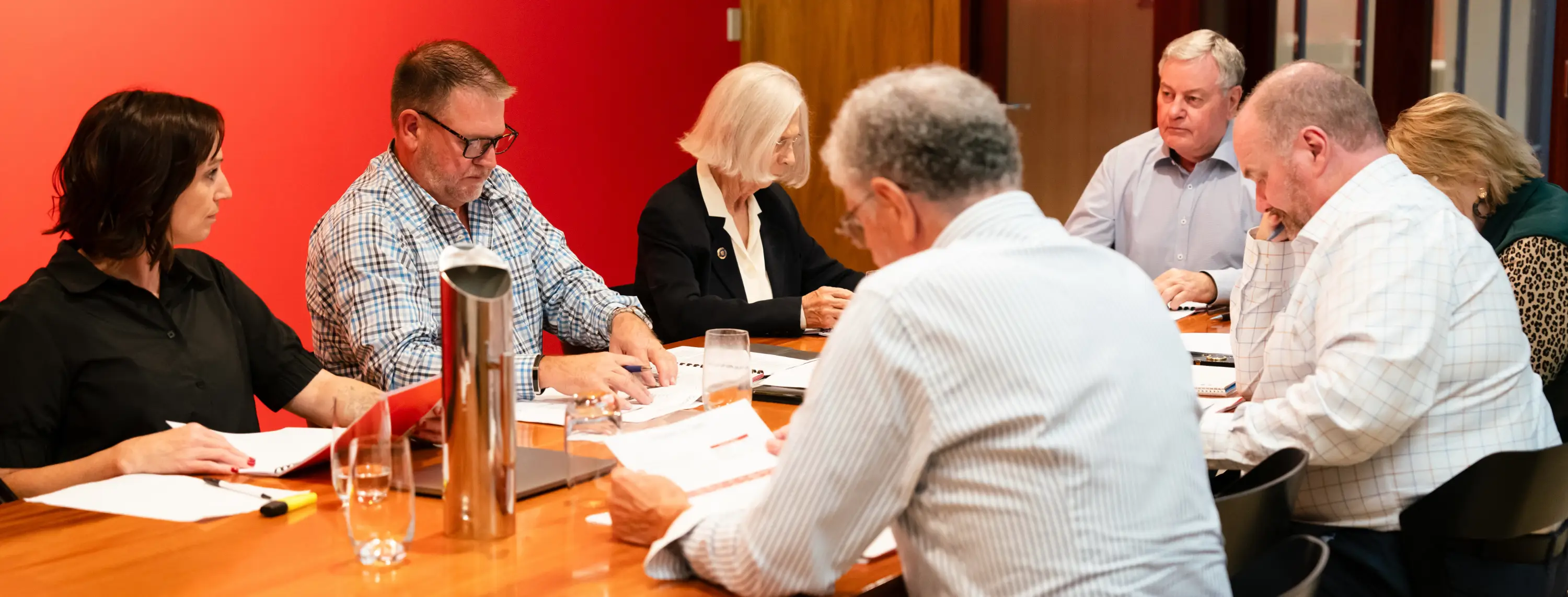

Dr Greg Lewis
B.Psych., M.App.Psych., Ph.D.
CHAIR
Dr Greg Lewis
B.Psych., M.App.Psych., Ph.D.
CHAIRMAN
Greg is a clinical and educational psychologist who has worked in the disability field for 35 years. From 1987 to 1996 he was Director of Country Services and a member of the Corporate Executive of the Disability Services Commission of Western Australia. During this time he established Local Area Co-ordination, which now operates across Australia and in several other countries. Until recently, Greg held the position of Adjunct Associate Professor at the Centre for Research into Disability and Society at Curtin University in Perth. He was formerly National President of the Australian Society for the Study of Intellectual Disability (1995 - 1997) and of National Disability Services (2003 - 2005). He was also Executive Director of EDGE Employment Solutions, a disability employment agency he co-founded in 1984. Greg was a co-founder of My Place, along with Peter Dunn and Phil Deschamp.

Ms Nicole Cox
BSW
MANAGING DIRECTOR
Ms Nicole Cox
BSW
MANAGING DIRECTOR
Nicole has worked in the disability sector for 18 years since completing her Bachelor of Social Work and commencing with Disability Services in the Department of Human Services in Victoria. Nicole moved to WA in 2007 to take up newly created role of National Disability Co-ordination Officer, funded by the federal Department of Education and auspiced by EDGE Employment Solutions. Over the ensuing five years, Nicole assisted people with disability across the Midwest, Wheatbelt, Pilbara and Kimberley regions to successfully transition from school to traineeships, apprenticeships and regular employment. In 2012 Nicole took up the position as sole Co-ordinator for My Place in South West WA, later progressing to team leader, finally, manager. Under her leadership over the following 11 years, the South West has grown from eight to 50 consumers being supported by five Co-ordinators across My Place's provider managed, shared management and shared co-ordination approaches. Nicole is responsible for My WorkPlace, which offers very individualised employment and self-employment opportunities to a growing number of My Place consumers in metropolitan and regional areas.

Mr Peter Dunn
Dip.Ed., B.Ed., Grad.Dip.Special Ed.
DIRECTOR
Mr Peter Dunn
Dip.Ed., B.Ed., Grad.Dip.Special Ed.
DIRECTOR
Peter arrived in WA in 1978 after teaching in country locations around New Zealand. Peter’s interest in disability was stirred after he commenced as a teacher in a large special education facility in Perth. From within the school system, he supported students to have greater opportunities in the local and wider community. In 1985, was promoted to position of principal at Mt Melville School in Albany. A key task was to provide support to teachers of students with disability in regular primary and secondary schools, and to progressively integrate the students with disability attending Mt Melville School into their local primary and secondary schools. In 1988, Peter was appointed inaugural Local Area Co-ordinator with the WA Department of Communities to support people with disability and their families across the Lower Great Southern. In this newly created position, the forerunner to more than 200 such positions around WA, he pioneered the development and delivery of supports that were individualised and reflective of what people with disability and their families wanted. In 1994, Peter moved back to Perth to manage the expansion of Local Area Co-ordination in the metropolitan area. Two years later, he was appointed Managing Director of the newly established My Place - a position he held for 13 years.

Ms Jane Anne McLarty
B.Soc.Sc. (Human Services)
DIRECTOR
Ms Jane Anne McLarty
B.Soc.Sc. (Human Services)
DIRECTOR
Jane Anne is the mother of four and grandmother of nine. Her eldest daughter is supported by My Place to live independently in her own home. Jane Anne and her husband are the full-time carers and guardians for one of her granddaughters, who is also supported by My Place. Jane Anne has observed many changes in the way disability services are provided since she first took her daughter to the Authority for Intellectually Handicapped Persons (AIH) in 1969. There was little available to people living in regional Western Australia, so the family moved to the metropolitan area seeking services that offered early intervention. Jane Anne worked in the disability sector between 1987 – 2010, holding various positions including co-ordinating a Volunteer Service and a Day Centre and working on various consumer focused projects. Since she retired, she has remained in the sector as a weekly volunteer. She is regularly invited to speak at seminars and workshops promoting models of service provision that enable people with disability to take control of their lives. The lives of both her family members have been enhanced using a form of individualised services, known as Shared Management, through My Place. Jane Anne also retains a keen interest in the beef farming industry, running a small herd at their property at Meelon.

Mr Dean Clarke
DIRECTOR
Mr Dean Clarke
DIRECTOR
Dean joined My Place in 1996 after working in the retail banking sector. Over the following 23 years he undertook a variety of roles spanning corporate services and personal support, giving him an appreciation of all aspects of My Place's operations and services. He first position was as Vehicle Fleet Controller, in charge My Place's rapidly growing fleet of wheelchair accessible vans, modified vehicles and regular motor cars. He was subsequently appointed Co-ordinator Payroll and HR Services and, ultimately, Manager Corporate Services. Dean has a family member living with disability, who is also a long-term employee of My Place, and has always been a strong advocate for individualised service approaches. This eventually led him to move into consumer support within My Place, commencing as a Personal Assistant to three young men with disability who were living in their own homes. Dean subsequently took up a position as Co-ordinator within Shared Management, which led to his involvement in establishing My Place's services in Albany and the surrounding Great Southern region. Dean returns to My Place as a Non-executive Director after four years managing a 200-bay campground in a cattle station on the Exmouth Gulf.
Individualised disability support care NDIS for people with disability in Western Australia contact information for My Place.
Contact Us
Address
- 17 York Street, Subiaco, Western Australia 6008
- Post: PO Box 869, Subiaco WA 6904
Phone/Email
- Telephone: (08) 6380 2927
- Facsimile: (08) 9388 7979
- E-mail: [email protected]
Business Hours
- Monday - Friday: 8:30am to 5pm
Complaints and Feedback
My Place works hard to get things right in delivering supports to you but realise supports can always be improved. Your feedback is crucial to improving those supports. Therefore, your complaints and feedback are welcomed.
Terms and Conditions of Service
My Place supports some Consumers who are also supported by the Office of the Public Advocate. My Place's standard terms and conditions of service are available here:
Individualised disability support care NDIS for people with disability in Western Australia information for the Accessibility Features on the My Place (WA) Pty Ltd website.
Accessing the Website
Keystroke combinations
Users with compatible browsers have the advantage of navigating the website with the applied access keys incorporated throughout this website. This allows you to navigate around the My Place website without using your mouse.
Different browsers use different keystrokes to activate accesskey shortcuts, as shown below:
- Alt + [the accesskey]
- Internet Explorer for Windows
- Chrome for Windows (not that Shift is required in some circumstances
- Safari for Windows
- Shift + Alt + [the accesskey]
- Firefox for Windows
- Ctrl + Option + [the accesskey]
- Safari for Mac
- Chrome for Mac
- Firefox for Mac
Key Mapping
| Access Key | Function |
|---|---|
| access key = a | Welcome to My Place |
| access key = b | You can do it all yourself... |
| access key = c | We can do it together... |
| access key = d | We can do it for you (but not without you)... |
| access key = e | About My Place |
| access key = f | Research and Evaluations |
| access key = g | Board of Directors |
| access key = h | Working at My Place |
| access key = i | Contact Us |
| access key = j | Accessibility Mapping |
